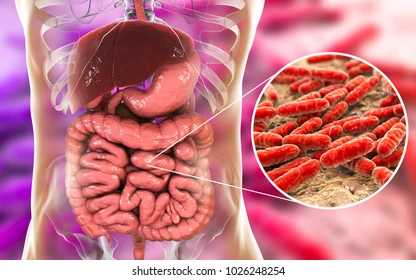
Diagnosed with Cancer? Your two greatest challenges are understanding cancer and understanding possible side effects from chemo and radiation. Knowledge is Power!
Learn about conventional, complementary, and integrative therapies.
Dealing with treatment side effects? Learn about evidence-based therapies to alleviate your symptoms.
Click the orange button to the right to learn more.
Does a Healthy Gut Fight Cancer?

Does a healthy gut fight cancer? Yes. Does oncology know how? Not really. The studies linked and excerpted below explain the current understanding as of 2024.
I am a long-term cancer survivor. Living with an incurable cancer since 1994 has taught me that evidence-based non-conventional therapies are the key to living with cancer. Having read the studies linked below, it seems to me that a healthy gut has two key advantages for me.
- First, a healthy gut may have prevented my original diagnosis of multiple myeloma-
- Second, a healthy gut may have increased the efficacy of my chemotherapy regimens as well as kept me strong during my aggressive conventional regimens.
How does a healthy gut microbiome fight cancer?
This post takes an evidence-based but non-conventional approach to a healthy gut as cancer therapy. Meaning, the FDA has not approved probiotics as a cancer therapy. Not yet anyway.
But this fact doesn’t prevent me from researching and writing about the gut microbiome any more than the lack of FDA approval prevents me from writing about any evidence-based non-conventional therapy.
Yes, cancer patients often need surgery, chemotherapy and radiation to manage their cancer. At the same time however, cancer patients need:
- Nutrition
- A healthy gut microbiome
- Supplementation
- Lifestyle therapies
etc. in order to manage their health while they undergo surgery. chemo and radiation.
Have you been diagnosed with cancer? What type? What stage? If you’d like to learn more about evidence-based non-conventional therapies shown to manage your cancer, let me know- David.PeopleBeatingCancer@gmail.com
Thank you,
David Emerson
- Cancer Survivor
- Cancer Coach
- Director PeopleBeatingCancer
Your Microbiome and Cancer: What to Know
“How can foods, medications, and supplements affect the microbiome?
Eating nutritious foods high in fiber and fresh fruits and vegetables can help feed the beneficial, or “good”, bacteria that already live inside your gut. These are called prebiotic foods. You can also eat foods that contain beneficial bacteria to help repopulate your gut microbiome. Fermented foods such as yogurt, sauerkraut, and kombucha have these bacteria. They are called probiotic foods.
Besides food, medications and supplements can act as probiotics or prebiotics. Synbiotics are supplements that combine both probiotics and prebiotics.
Cancer treatments such as chemotherapy and radiation therapy can disrupt your gut microbiome. Scientists are studying whether probiotics could help rebalance the microbiome in a person receiving cancer treatment. For instance, some research has shown that probiotics may reduce diarrhea in people receiving chemotherapy for lung cancer and in people who have surgery for colon cancer.
Other scientists worry about the safety and risks of probiotics. For example, many probiotics are sold as dietary supplements. This means they are not regulated by the U.S. Food and Drug Administration (FDA).
Always talk with your doctor if you are thinking about taking any supplements, including probiotics, prebiotics, or synbiotics. This is particularly important to do during cancer treatment…”
We Know a Healthy Gut Fights Infection. New Study Reveals How
“When a large, diverse community of gut bacteria compete with pathogens for nutrients, the pathogens may not have enough fuel to colonize and invade the body, according to a new study in Science.
The more microbes there are, the more different nutrients they’re likely to eat, increasing the chances of nutrient overlap with the pathogen. The greater the overlap, the better the host is protected, the study found…
Though some strains blocked pathogen growth better than others — Escherichia coli performed the best — none alone could prevent colonization. But when researchers pooled the top 10 best pathogen-fighters, protection was much more robust. Combining 50 species worked better still, if these included E coli…
Compared with other species, these “key” species (E coli among them) consumed more of the same nutrients as the pathogens, the researchers discovered. Individually, they did not have enough overlap to stop pathogen growth — but communities including these strains had the highest overlap and provided the best protection…
Why It Matters
Though much more research is needed, these findings could pave the way for microbiome-based treatments for infectious diseases, the researchers said.
“We could use this nutrient blocking effect to make and successfully validate predictions about which combinations of gut bacteria would be most protective against a given pathogen,” Spragge said…”
Understanding the role of the gut microbiome in gastrointestinal cancer: A review
“Gastrointestinal cancer represents one of the most diagnosed types of cancer. Cancer is a genetic and multifactorial disease, influenced by the host and environmental factors. It has been stated that 20% of cancer is caused by microorganisms such as
- Helicobacter pylori,
- hepatitis B and C virus,
- and human papillomavirus.
In addition to these well-known microorganisms associated with cancer, it has been shown differences in the composition of the microbiota between healthy individuals and cancer patients. Some studies have suggested the existence of the selected microorganisms and their metabolites that can promote or inhibit tumorigenesis via some mechanisms.
Recent findings have shown that gut microbiome and their metabolites can act as cancer promotors or inhibitors.
It has been shown that gastrointestinal cancer can be caused by a dysregulation of the expression of non-coding RNA (ncRNA) through the gut microbiome…”


